Before today I thought that a Via Ferrata was a hiking trail with some sections of ladders and cables to keep you safe on the tricky bits. Now I’m in South Tyrol, in the heart of the Dolomites, I quickly realize that a Via Ferrata is not a hiking trail, but a rock climb and since I’ve never climbed in my life it’s a somewhat scary prospect. On my previous hikes in the Alps on the Tour de Mont Blanc I’d come across the odd cable or ladder, but always managed to find an easier alternative route. Today there’s no escape.
Safety check with my guide
I meet my guide Veronika at the Catores Mountain Guide offices in Ortisei where she fits me out with the helmet and harness I’ll need, as well as the two karabinas and the rope that she’ll secure to my harness. The back story here is that these climbing routes, literally “iron roads” were originally built with ladders and cables to enable soldiers in the First World war to move around the Dolomites safely.
Italian and Austrian solders, just as young and fit as the climbers I’ll meet on the mountain today, fought to dominate this area, building trenches and trying to blow each other up on the mountain.
I hope you enjoy my video below of climbing the Via Ferrata in South Tyrol.
If you can’t see the video above of climbing the Via Ferrata in South Tyrol, see it on my blog here or Youtube here and please do subscribe using the button above
Click here for direct download of video file
Despite the Austrians having won the battle, the Italians won the war because they were on the side of the Allies and in the post-war division of spoils were given the province of South Tyrol to add to their territory. These days the Via Ferrata have been restored to allow climbers to enjoy the Dolomites, beginners like me in the company of a guide, while more experienced climbers can use them on their own so long as they have the right equipment.
The starting point
The cable car takes us up the mountain to the start of our climb, although by now the cloud is swirling around us and hiding the peaks opposite from view. The path climbs steadily above the mountain restaurant, getting progressively more steep, while I get progressively more breathless.
As I walk up mundane thoughts swim and swirl around in my head. Will my nails, newly manicured and polished for this trip stand up to the battering? What are the kids doing back home? How can I capture the experience (for your benefit dear readers) without my iPhone slipping from my hand and plunging down to the valley below?
I scrabble for handholds to steady myself on the dusty rocks, wishing that I’d worn my fingerless cycling gloves that Veronika said I didn’t really need for such a short climb. At the top of the approach Veronika suggests that I take off all my rings as they could get caught or damaged on the rocks and I very carefully zip them into my pocket, terrified that I’ll drop my wedding ring and it will roll all the way down the mountain.
“Where are all the ladders and cables?” I ask. Veronika points up the mountain and tells me “this is just the start”. I look up at what seems like a sheer wall of rock with a cable running up it. Fear takes hold. I’m no climber. How on earth will I get up there?
How to climb
At the start of the cable, Veronika shows me how I should clip on both my karabinas and slide them along with one hand while the other hand finds a hold on the rock. At the places where the cable is secured to the rock I unclip one karabina and clip it back on the other side of the metal bar, then do the same with the other karabina, always secured to the cable in case I fall.
Beautiful edelweiss
Veronika points out an edelweiss, an increasingly rare sight on the mountain. I once posted a photo of what I thought was edelweiss when I was walking the Tour de Mont Blanc, quickly to be corrected on Twitter that it was a thistle! This is the real thing – looking like a felt flower that you might tuck in your hat. Set into the side of the raw rock nearby, I spot a little shrine with a statue of the Madonna. “She keeps us safe on the mountain,” Veronika tells me.
A group is climbing up below us and I start to panic slightly – will I need to speed up or will I be holding up the entire mountain? They all look like they know what they are doing with wrap around sunglasses and tanned muscular arms. Veronika is endlessly patient as she waits for me to take my time and progress slowly upwards. In the meantime she takes out her camera and takes photos of me grinning up at her. I AM enjoying this, I tell myself.
The climb and getting used to it
Now I start climbing in earnest and everything is focused on this moment. Everything becomes very small. One step up. I look up to find the next handhold. Now the next foot. Will I really be able to balance my weight on such a tiny ledge? Don’t look down. It’s just about the next handhold. It’s just about the next foothold.
Now I understand how climbing can be a kind of meditation to clear your mind of the jumble of thoughts and crumbs of everyday life. As I climb it’s not about admiring the views or the wonder of the Dolomites. It’s about this moment of concentration, the next foothold, the next handhold. Like a mathematical problem to be solved, there’s a sequence of moves that will get me up the rock face. If my hand goes here, then my foot can go there and my next hand here and my next foot there.
“Small steps”, says Veronika encouragingly “small steps”. But there are places where only a big step up will do, as I hoist myself up inelegantly, praying that the tiny ledge I’ve chosen as a foothold won’t give way. My upper body strength is pathetic and I’m feeling every old twist or sprain in my arms and wrists. I can see why climbers are so lean and strong and why they seem so calm and confident. Up here on the mountain is no place to get excited, you can’t take your frustration out on the mountain because the mountain will win.
Appreciating the magnificent view
It’s a relief when we arrive on a flatter path with sheer drops on either side and take the opportunity to pose for a few photos. Now I have the chance to look around at the view. The cable car station is a toy town building down in the valley with the access track snaking up to it and the cloud hanging over the plug of rock that is Sasso Lungo.
Veronika is agile as she trips lightly up the steep slope, surefooted as a mountain goat. I scrabble behind her on all fours in undignified fashion trying to find handholds on the slope ahead of me, more of a spider than goat. A short climb later and we’re suddenly at the top, sharing a tiny peak of rock with two other ladies of my age who are chatting away as if this were a social gathering (which it probably is for them).
Once I am settled with my bottom on that peak they head down and now we have the whole of the Dolomites to ourselves. Without moving my bottom an inch I gingerly get out my camera and twist my body round to take in the panorama of jagged peaks around me.
Going down is much easier
Veronika takes more photos of me sitting there, clambering surefooted up to the next bit of rock and leaning so far out to get the perfect shot that I feel sure she will fall. I savor the moment of my success in getting up here but then the realization dawns that I’m going to have to get down again. “Don’t worry” says Veronika “the way down is much easier”. I’m relieved that I won’t have to climb back down that vertical rock face, but first we have to rappel the short distance down off this peak to where we pick up the cable again.
Veronika instructs me how to lean away from the rock face, letting the harness take my bodyweight. “Two hands on the rope” she calls to me but I’m too scared and my hand reaches out for the cable, half scrambling, half abseiling down. Just below the peak we pick up a different path, easier than the sheer rock face as Veronika has promised but still not a walk in the park.
We are still clipped to the cable but the dusty shale and rubble slides underfoot and my muscles are now rebelling against the contortions they’ve been put through. I’ve scraped my knee and my thighs keep going into spasms. After my brief success it’s time to focus again, we’re not down yet. The cable snakes down a rocky couloir and again I scrabble as Veronika follows surefooted behind.
At some point we abandon the cable but she still has me on the rope. Finally she expertly winds up the rope and we’re walking over the dusty rock on a path that’s barely there. Down to where the rock ends and the grass starts, down again to the cable car station and down again to the valley to pick up the car and drive back to Ortisei.
Back in Bolzano that afternoon I meet a local lady and tell her of my daring exploits climbing in the Val Gardena. “Oh yes” she smiles, “that’s where we love to take the kids climbing on a Sunday”. My bubble bursts as I realize that for the locals a family climb in the Dolomites really is a bit like a walk in the park. But even though it’s not quite Everest, I still feel secretly thrilled at the achievement of climbing MY first Via Ferrata.
If you’d like to try a Via Ferrata in South Tyrol
The Piccola Cir Via Ferrata took around 4 hours door to door from the Catores office and around 2.5 hours from the top of the Dantercepies cable-car station (1.5 hours climbing up & 1 hour down). All safety equipment (harness and helmet) was provided as part of the climb.
Thanks to my guide Veronika Schrott who can be contacted via the Catores Alpine School in Ortisei, Val Gardena e-mail: [email protected]. The main office of the mountain guides is at Via Rezia 5 in Ortisei where you can arrange guided climbs, hikes and ski safaris in South Tyrol with routes suitable for families and beginners as well as advanced climbers as part of a group. Four people is the maximum each guide can cover.
For more technical details of the Piccola Cir Via Ferrata visit the Sentres website
Information, articles and resources for South Tyrol
For more information to plan your own visit, find accommodation and discover all the things to do in South Tyrol, visit the South Tyrol Tourism website and watch videos about the region on their YouTube channel. For updates on things to do in South Tyrol follow the South Tyrol Twitter and Instagram pages
My thanks to the South Tyrol Tourism Board for their support* in this trip in collaboration with Travelator Media.
* More info on my policies page
This article is originally published at Heatheronhertravels.com

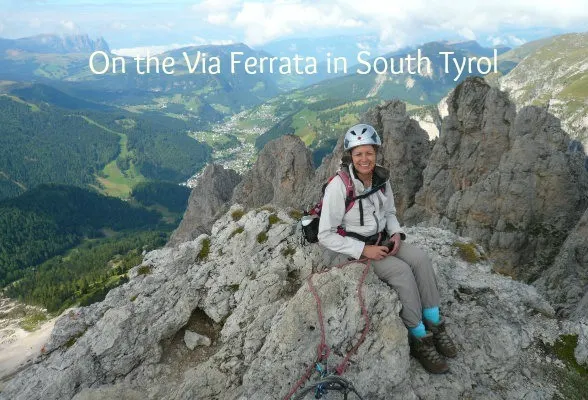
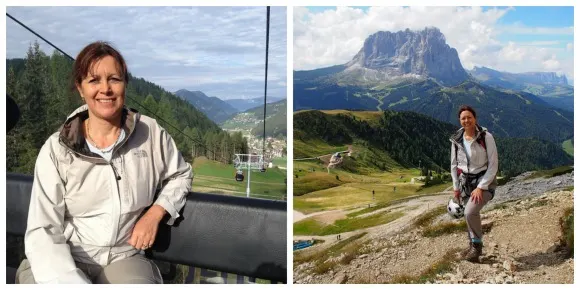
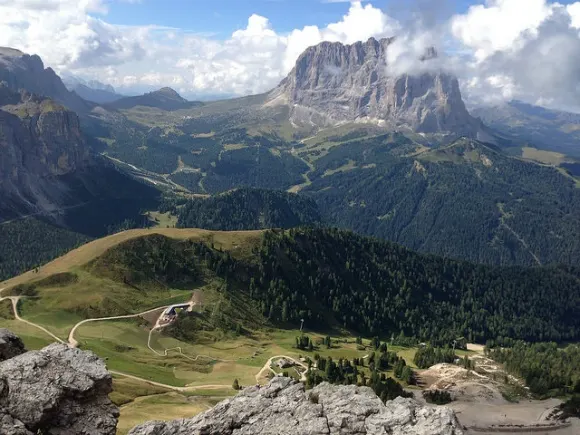
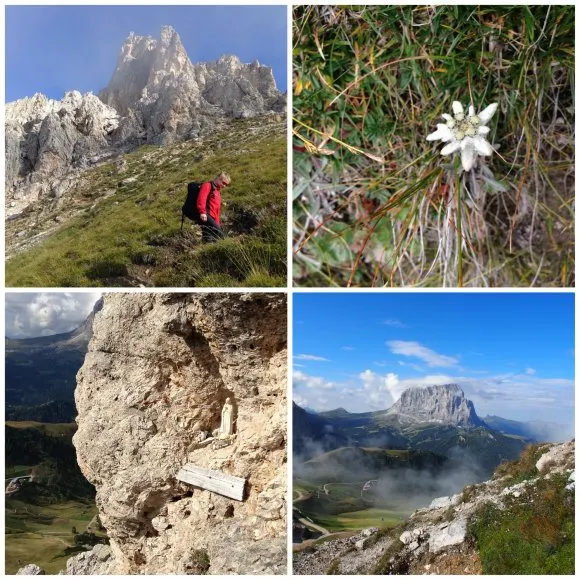
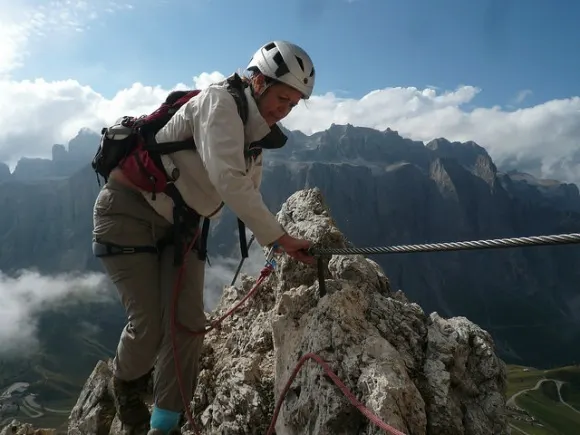
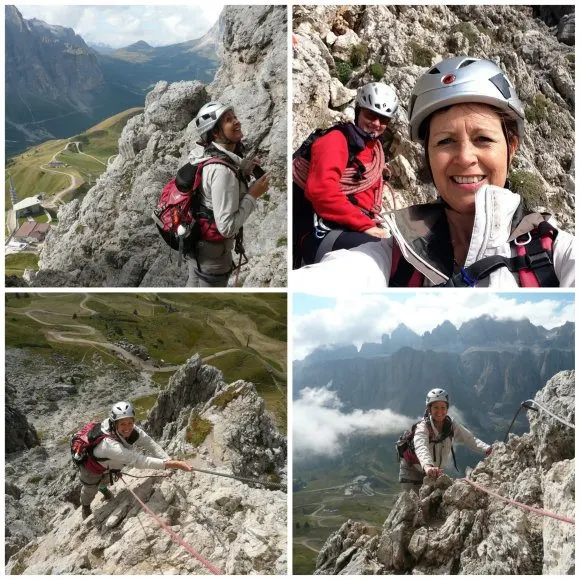
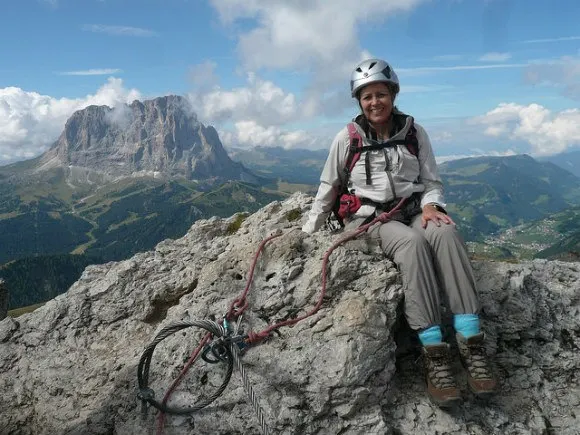
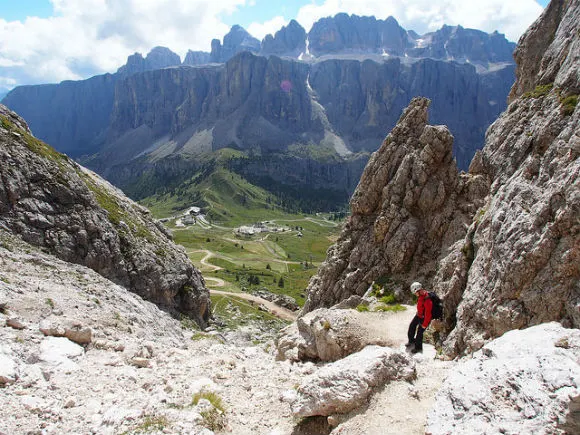
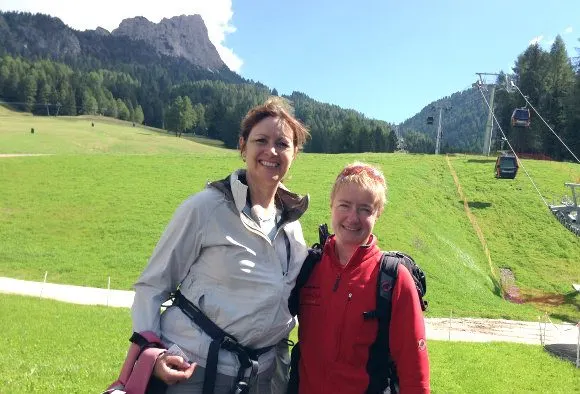

Colin Service
Wednesday 10th of December 2014
Excellent article. I love the dolomites but I also love the small local Valleys off the tourst trap. My number one destianation Which I can highly recommend in Ahrntal Valley...amaznig hospitality and outstanding trecking. Hotel recommendations is Alpen Palace Wellness and Spa Resort.
Heather Cowper
Wednesday 10th of December 2014
@Colin Thanks, I'll certainly explore the Ahrntal valley and Alpen Palace if I have the chance to get back to South Tyrol
Lucy
Monday 27th of October 2014
Fantastic views - though I think I'd be a bit shaky up there!
Heather Cowper
Monday 27th of October 2014
@Lucy yes I felt quite nervous at the top and pleased when I was on the way down although I did get the whole panorama of the Dolomites
Larry
Friday 24th of October 2014
The history of Via Ferrata was one that I was not aware of ... while you may have been nervous of the climb, at least the epic views you saw along the way were their own reward!
Heather Cowper
Saturday 25th of October 2014
@Larry it's one of those experiences where on the way up you think never again and on the way down you think when can I do it again?
Abi
Thursday 23rd of October 2014
Ah, it's such a great sport! Glad you tested your mettle on it :-)
Heather Cowper
Saturday 25th of October 2014
@Abi yes not sure I'll be trying it again in a hurry although wouldn't mind doing a few shorter stretches now I know what to expect
Kathryn Burrington
Tuesday 21st of October 2014
I remember seeing your photos on social media of your achievement. I was amazed then and thoroughly thrilled for you but your account here is even more impressive. Congratulations! And may I ask, what's next?
Heather Cowper
Tuesday 21st of October 2014
@Kat Well I'd like to say that I'll be doing more rock climbing but to be honest I think I'll probably be sticking to the hiking - the Dolomites certainly offer plenty of opportunities for that.